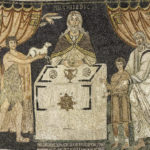We run our website the way we wished the whole internet worked: we provide high quality original content with no ads. We are funded solely by your direct support. Please consider supporting this project.

Cruciform Aikido Pt 2: God-Forsaken Judgment
So if Jesus is the supreme revelation of what God is like, as we explained in our last post, what does that tell us about the nature of God’s judgment?
As Jesus was dying on the cross he cried out, “Eli, Eli, lema sabachthani?,” which means, “My God, my God, why have you forsaken me?” (Mt. 27:46). This shocking cry reveals that on the cross, the all-holy Son of God experienced God-forsakenness as he bore the sins of the world. In the words of Paul, God did not “spare his own Son” but “gave him up for us all” (Rom. 8:32) and “delivered him over to death for our sins” (Rom. 4:25). On the cross, we see, the one who bore our sin experienced God’s judgment on all sin by being abandoned to suffer the death-consequences of all sin. The essence of divine judgment, we see, is divine abandonment.
As he usually does, God worked through human agents when he abandoned Jesus. Hence Scripture also says that Judas delivered Jesus up to the Jewish authorities (Mt 26:2, 14-15; Mk 10:33; Lk 22:4-6) while the Jewish authorities in turn handed Jesus over to the Roman authorities to be killed (Mt 27:18; Lk 20:20). The Father’s act of delivering Jesus over to suffer, we see, was mediated through humans who delivered Jesus over to suffer. This is why Scripture describes these wicked acts as taking place in accordance with “God’s deliberate plan and foreknowledge” (Ac. 2:23, cf. 4:27-28). It’s not that God predestined or in any way caused these specific individuals to betray or abuse Jesus, for this would make God the determiner of these individuals’ sin and thus make him complicit in their evil. Rather, God used individuals who had, of their own free volition, already made themselves evil, to fulfill his predestined plan. Through the wicked character and evil intentions of Judas as well as Jewish and Gentile authorities, God delivered Jesus over to suffer for the sins of the world.
But it wasn’t only human agents who played into God’s predestined plan. Even more importantly, God delivered Jesus over to Satan and other fallen powers to carry out their evil agendas against him. John indicates that Satan was instrumental in Judas’ betrayal (Jn 13:27), while Paul teaches that ruling cosmic powers were behind the scenes orchestrating Christ’s crucifixion (I Cor 2:6-8). Moreover, in the process of delivering Jesus over to suffer at the hands of these fallen powers, God was wisely turning the wickedness of these spirit-agents back on themselves such that they brought about their own defeat. Hence Paul teaches that, if the wicked powers had understood the wisdom of God that had been kept secret throughout the ages, they “would not have crucified the Lord of glory” (I Cor. 2:8). For by means of the crucifixion — which they themselves helped orchestrate — God “canceled the charge of our legal indebtedness” and thereby “disarmed the powers and authorities… triumphing over them…” (Col. 2:14-15). Through the unsurpassable love of God expressed on the cross, God defeated the devil, and thereby freed humanity and all creation from his rule (Heb. 2:14; I Jn 3:8).
Through the crucifixion, in short, God ingeniously turned evil back on itself and triumphed over it. But what does all this teach us about the nature of divine judgment?
Stay tuned…
Cruciform Aikido Series
Image by Flickr user bRokEnCHaRacTer . Used in accordance with Creative Commons. Sourced via Flickr.
Category: General
Tags: Cruciform Theology, Judgement
Related Reading

Part 4: An Alternative Cross-Centered Approach
Image by Karl Pang via Flickr As I mentioned in Part II of this review, I am deeply appreciative of the fact that Flood grasps the centrality of enemy-loving non-violence in Jesus’ revelation of God. And while many, if not most, of the depictions of Yahweh in the Old Testament are consistent with this revelation, I…

The Centrality of Christ in Hebrews, Part 2
The intensely Christocentric reading of the Old Testament that I introduced in the previous post is reflected throughout the book of Hebrews. Here I want to cite two more examples of how this writer saw Christ at the center of the OT. Hebrews 7 Here the author argues for the superiority of Christ’s priesthood over…

Podcast: How Do You Teach a Cruciform Hermeneutic from the Pulpit?
Greg talks about infallibility and inerrancy. http://traffic.libsyn.com/askgregboyd/Episode_0281.mp3

Podcast: Would a Loving God Create a Box that Killed Anyone Who Touched It?
Greg discusses the Ark of the Covenant and it’s strange and violent nature. http://traffic.libsyn.com/askgregboyd/Episode_0266.mp3

Who Curses the Earth?
After the “fall” of Adam and Eve in the Garden of Eden, their sin results in a five curses: on nature, on marriage, on human life, on the serpent, and on women during childbirth. Who is it exactly that afflicts the world with these curses? While the author speaks about the curses on nature (Gen…

Did God Destroy Sodom and Gomorrah? (podcast)
Greg considers the destruction of Sodom and Gomorrah and speculates on the nature of the angels who were sent there. Episode 597 http://traffic.libsyn.com/askgregboyd/Episode_0597.mp3
